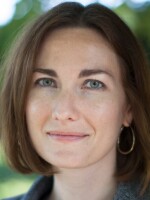COEUR D’ALENE, Idaho - At an intersection in the the quaint resort town of Coeur d'Alene, there are two signs for cupcakes. And each one points in a different direction. Downtown Coeur d’Alene is not very big yet it has two cupcake shops. It’s an example of an economic phenomenon that’s actually not that strange -- in fact, we see it everywhere.

Shawna Leonard owns Sweet B cupcakes.
“We have many flavors," she says. "Like red velvet, chocolate, white chocolate raspberry. Candied sweet potato.”
Gourmet cupcakes have been trendy in the Northwest for a while now. And Leonard thought her north Idaho town was ready for them.
“I’ve always liked to bake and even in the grocery store, there's not a place to get a slice of cake. You have to buy the whole thing.”

But just outside the door of Sweet B is a crosswalk and it takes you right to another cupcake shop. It’s called Frosted -- run by Jennifer Tarr and Daria Brown.
And they also saw a demand for cupcakes.
“It reminds you of a little treat you’d get when you were a kid," Tarr says. "Something special your mom would give you.”
Now, the owners of both shops are quick to say that they're not in competition.
“Well she has her following, we have our following,” Tarr says.
But something has been happening over the last nine months that looks a lot like competition. One shop will add gelatto, the other will add ice cream. One shop offers coffee, then the other adds espresso, then the first one adds espresso. They both have the same hours:
“9:30 to 5 or until we sell out,” for Leonard.
“9:30 to sold out,” for Tarr and Brown.
And even some of the flavors sound pretty similar.
At Sweet B: “We have our peanut butter cup, which is a chocolate cake with a peanut butter frosting ...”
And at Frosted: “And then our peanut butter cup, which is a chocolate cake with a rich peanut butter frosting ..."
Back to Sweet B: “And that is our Irish carbomb, which is a Guiness chocolate cake ...”
And again at Frosted: “It’s called an ailing Irishman. It’s a Guiness’d out chocolate cake.”
But here's the kicker: Even in a bad economy, even with a virtually identical competitor, both shops say they’re doing just fine.
“I'm doing way better than I could have imagined AND I have a competitor across the street,” Leonard says.
In fact, this happens all the time, but on a larger scale. Think of the Lowe's next to the Home Depot. Or a McDonalds next to a Burger King. Or, some economists like to point to this example, from comedian Lewis Black on Comedy Central.
“And across the street from that Starbucks, in the exact same building as that Starbucks ... there was another Starbucks.”
Lewis Black called it “the End of the Universe.” But economists call that Hotelling's law.
“Hotelling's law describes a tendency for competing firms to end up making their products as similar as possible,” explains economist Caitlin Knowles Myers. She teaches about Hotelling’s law at Middlebury College in Vermont.
“This could mean that they're producing virtually identical goods or that they're locating next to each other spatially,” she adds.

Hotelling, by the way, has nothing to do with hotels. Harold Hotelling was an economist who wanted to examine an economic conundrum: Why does competition sometimes produce less variety? He laid out the law now named for him in a 1929 paper.
To understand it, Myers says, take two ice cream stands at opposite ends of a beach.
“If one of those firms moves a little closer to the center, he doesn't lose any of his customers from the outside, and that force tends to draw the firms closer together.”
Myers says Hotelling's law can be seen in everything from uniform refrigerator design to why political candidates end up having similar platforms.
Back in Coeur d'Alene, both cupcake shops say, for the record, they found out the other one was opening after they had already laid the groundwork for their business. At the online review website Yelp, the competition has heated up a bit, as mixed reviews have flown back and forth.
But both shops are staying as sweet as their frosting on the subject.
“I encourage everyone to try both and see what they think,” says Sweet B's Leonard.
And over at Frosted:
“You should try both of them,” says Brown.
Tarr agrees. "We always tell people, just try them”
In the end, this competition may just come down to ... a matter of taste.
On the Web:
Sweet B Cupcakes:
http://www.sweetbcupcakes.com/
Frosted Cupcakes:
http://www.yummyfrostedcupcakes.com/
Copyright 2011 Northwest News Network
Copyright 2011 Northwest News Network


